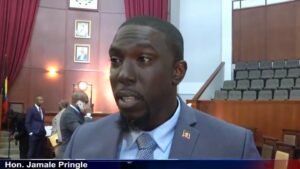Tanzania's political landscape experiences a significant shift as the main opposition party, Chadema, faces disqualification from the upcoming elections, a move that raises concerns over the state of democracy and political freedom in the country.
Tanzanian Opposition Party Disqualified Ahead of Elections Amidst Political Turmoil

Tanzanian Opposition Party Disqualified Ahead of Elections Amidst Political Turmoil
Tanzania's main opposition party, Chadema, is barred from elections following its leader's treason charges, raising alarm over political freedoms.
In a major blow to political opposition in Tanzania, Chadema, the main opposition party, has been disqualified from this year’s elections after failing to sign a crucial code of conduct document. The decision comes just days after the party leader, Tundu Lissu, was arrested and charged with treason in connection with a rally where he advocated for electoral reforms.
Ramadhani Kailima, the director of elections at the Independent National Elections Commission, announced that Chadema would not be able to participate in the parliamentary and presidential elections scheduled for October. Additionally, the party will be barred from any by-elections until 2030. This action seriously undermines the opposition’s ability to contest the ruling Chama Cha Mapinduzi party, which has maintained power in Tanzania for almost six decades.
Prior to the announcement, Chadema made it clear that it would abstain from attending the signing ceremony for the code of conduct, arguing that true electoral reform is necessary for fair elections. In the context of the upcoming elections, Lissu had been positioned to contest against the sitting president, Samia Suluhu Hassan, who assumed office in 2021 following the death of her predecessor.
While Hassan was initially commended for dismantling some authoritarian practices from the past regime, critics assert that her administration has increasingly targeted political dissent through arrests and intimidation. Despite government assurances, allegations of a crackdown on opposition members have intensified as the elections approach.
Lissu, known for his defiant stand under the motto “No Reforms, No Election”, contends that without significant changes to the electoral system—particularly concerning the independence of the electoral commission—free and fair elections are unattainable. Accusations against him include inciting rebellion through his calls for reform, a charge his lawyer claims is politically motivated.
Having endured numerous arrests and even a near-fatal assassination attempt in 2017, Lissu returned to Tanzania in 2023 after a period of self-exile, following promised reforms by the government aimed at improving conditions for political opposition. His current remand remains in place, with the case expected to resume on April 24.
The environment surrounding these elections illustrates the tension between political rights and state authority, prompting further scrutiny of Tanzania's democratic processes.
Ramadhani Kailima, the director of elections at the Independent National Elections Commission, announced that Chadema would not be able to participate in the parliamentary and presidential elections scheduled for October. Additionally, the party will be barred from any by-elections until 2030. This action seriously undermines the opposition’s ability to contest the ruling Chama Cha Mapinduzi party, which has maintained power in Tanzania for almost six decades.
Prior to the announcement, Chadema made it clear that it would abstain from attending the signing ceremony for the code of conduct, arguing that true electoral reform is necessary for fair elections. In the context of the upcoming elections, Lissu had been positioned to contest against the sitting president, Samia Suluhu Hassan, who assumed office in 2021 following the death of her predecessor.
While Hassan was initially commended for dismantling some authoritarian practices from the past regime, critics assert that her administration has increasingly targeted political dissent through arrests and intimidation. Despite government assurances, allegations of a crackdown on opposition members have intensified as the elections approach.
Lissu, known for his defiant stand under the motto “No Reforms, No Election”, contends that without significant changes to the electoral system—particularly concerning the independence of the electoral commission—free and fair elections are unattainable. Accusations against him include inciting rebellion through his calls for reform, a charge his lawyer claims is politically motivated.
Having endured numerous arrests and even a near-fatal assassination attempt in 2017, Lissu returned to Tanzania in 2023 after a period of self-exile, following promised reforms by the government aimed at improving conditions for political opposition. His current remand remains in place, with the case expected to resume on April 24.
The environment surrounding these elections illustrates the tension between political rights and state authority, prompting further scrutiny of Tanzania's democratic processes.




















